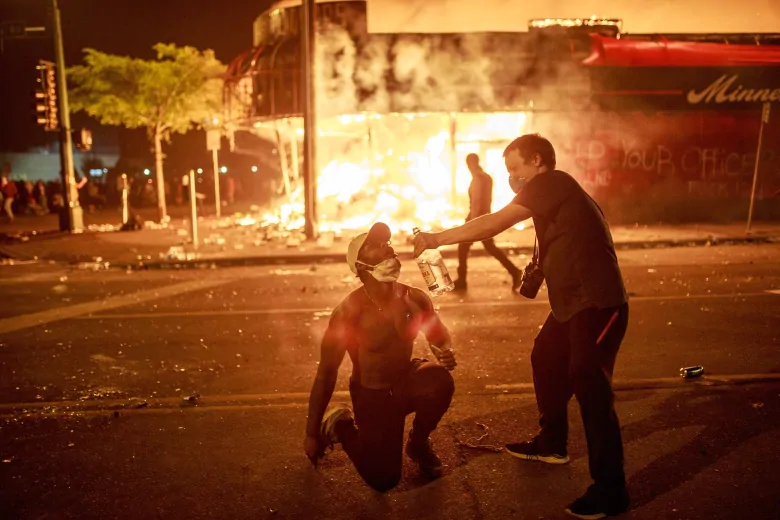In his response to the protests against the deaths of African Americans at the hands of police officers that have erupted in several U.S. cities, U.S. President Donald Trump is doubling down on a bet rooted in history: that when civil-rights protests turn riotous, Americans will favour the iron fist.
U.S. President Donald Trump is doubling, tripling and quadrupling down on a bet rooted in history: that when civil-rights protests turn riotous, Americans will favour the iron fist.
His Twitter feed on Saturday again filled with martial language — about using vicious dogs and ominous weapons if protesters storm the White House; the need for strength and old-style generals; and protesters being screaming ranters whom he tacitly encouraged his own supporters to confront.
Commentators have drawn parallels to the 1968 law-and-order message of Richard Nixon, whom Trump’s own former campaign manager called an inspiration.
History carries more recent examples.
They loom again as protests for racial change are sweeping across U.S. cities in an election year and clashing with demands for law and order.
A researcher who studies moments like these in American life was startled by something he noticed about another police-related death and its destructive aftermath: the shooting death of Michael Brown, 18, in Ferguson, Mo., in 2014 by a police officer.
His findings involved the reaction of a certain type of American: the self-declared independent white voter. And a certain politician: Trump.
“I was pretty struck when we did the data analysis,” said Kevin Wozniak, who studies the politics and public opinion of criminal justice at the University of Massachusetts.
He and colleagues examined voters’ reaction during the 2016 election to being shown different images, including one of police officers in riot gear atop an armoured vehicle.
They found that whites who called themselves independent voters became 10 percentage points likelier to declare support for Trump after seeing that image.

The findings are pertinent politically following fury over the death of George Floyd, an unarmed black man who died after a policeman kneeled on his neck, prompted nights of protest, arson, looting and vandalism in several American cities.
Authorities in Minneapolis accused white agitators from outside the state of committing much of the vandalism, a claim Trump has echoed on his Twitter feed.
WATCH | Minneapolis mayor calls in National Guard:
Protesters in Minneapolis took to the streets for a fourth night on Friday, and the city has deployed the National Guard. Saturday morning, some residents have returned to clean debris left after the protests. 5:13
Trump’s track record
Earlier this week, one of Trump’s tweets was slapped with a warning label from Twitter for glorifying violence. Trump later insisted that he was not, in fact, endorsing extrajudicial execution when he tweeted: “When the looting starts, the shooting starts.”
He said he was simply calling for peaceful protests, and warning about the danger of violence: he noted that seven people were shot in Louisville, Ky., during protests over another police-involved death — that of Breonna Taylor, a 26-year-old emergency medical technician.
But there’s history leading up to that Trump tweet and his latest comments Saturday.
He’s the same president who referred to mostly black NFL players, peacefully protesting police violence during the national anthem, as sons of bitches.
He’s gotten cheers from a crowd of police officers for telling them that when arresting violent suspects, “Please don’t be too nice.”
The history behind the quote
Books such as The New Jim Crow, by

